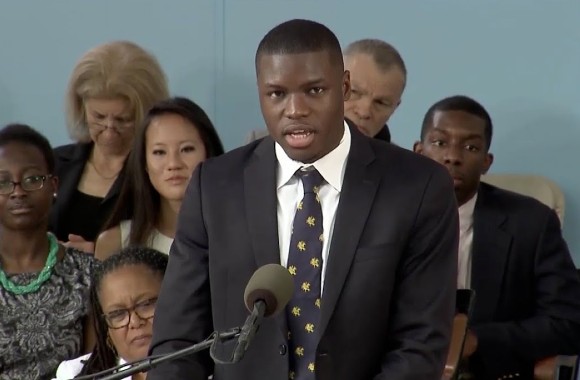
No deadline for punishing students after they have graduated, lawyer says
Harvard University pulled a bait-and-switch on a graduating student by featuring him as class day speaker but withholding his diploma based on last-minute sexual assault claims, the student’s lawyers argued earlier this month.
In oral arguments before the 1st U.S. Circuit Court of Appeals, they said Harvard had to violate its own policies to deny the diploma to Damilare Sonoiki, who was accused two days before graduation in 2013 and charged after the ceremony.
Sonoiki’s legal team is challenging a trial court ruling that allowed Harvard to judge him guilty of sexual misconduct based on an evidence standard – “sufficiently persuaded” – that it never defined.
They argued that Harvard used “fatally vague” policies that violated basic fairness to the student, who went on to work as a Goldman Sachs analyst and writer for The Simpsons and Black-ish.
Sonoiki sued Harvard in 2019 to receive his diploma and clear his name of sexual assault accusations.
Harvard acted in an arbitrary and capricious manner by relying on its “sufficiently persuaded” standard, “an uncertain, indeed elastic, concept,” co-counsel Kristina Supler told the three-judge panel.
Sonoiki’s very participation in the ceremony (below) suggested that he would receive a degree, co-counsel Susan Stone said. Harvard should have placed him on “an involuntary leave of absence” under its own procedures, but instead left him in “good standing.”
Harvard lawyer Anton Metlitsky argued that his client behaved reasonably. Sonoiki’s lawyers are making a harsh argument – that Harvard should have precluded him “from walking and giving a class day speech based on an allegation” alone.
The university is not required to grant a degree when charges of sexual assault are pending against a student, Metlitsky said.
Despite Sonoiki’s professional success, the fallout from Harvard’s sexual misconduct proceeding has dogged him for years.
In 2018 he pleaded guilty to charges that he engaged in a $1.2 million insider trading scheme with former Philadelphia Eagles player Mychal Kendricks. Sonoiki claimed he did so in order to fund his future legal challenge against Harvard.

‘How could we know’ if adjudicators acted arbitrarily without evidence standard?
Harvard has long faced scrutiny for its sexual misconduct procedures, even internally.
A year after Harvard found Sonoiki guilty, more than two dozen Harvard law professors publicly accused the university of lacking “the most basic elements of fairness and due process” in Title IX proceedings.
They are “overwhelmingly stacked against the accused, and are in no way required by Title IX law or regulation,” the law professors wrote in the Boston Globe. (Their criticism is cited in Sonoiki’s lawsuit.)
But it wasn’t until 2018 that a punished male student sued the Ivy League University for his treatment in a sexual misconduct proceeding.
U.S. District Judge Denise Casper wasn’t convinced by the law professors’ criticism when she tossed Sonoiki’s lawsuit last June.
Sonoiki’s lawyer Stone questioned “the basic premise” of Casper’s argument favoring Harvard: that Harvard policies did not promise to give students their degree even if they complete the requirements and are in good standing.
“That is just as wrong as it sounds,” Stone said: “Any student would have a reasonable belief” that paying tuition, attending class and avoiding suspension would result in walking at graduation.
After graduation, Harvard policy as applied “failed to provide him with reasonable expectations,” she said. It chose the undefined evidence standard of “sufficiently persuaded” to avoid comparisons to a legal proceeding.
But if Harvard is going to “make up a term” that is so crucial in determining the course of discipline, it should have “at least defined the term in either its handbook” or related documents.
Stone gave the example of a restaurant where the server has asked the three-judge panel if they want dessert:
One judge on this panel might say, “I’m sufficiently full, I don’t want dessert.” Another judge might say, “I would like a sliver for me to make a decision whether I am sufficiently full.” And finally, the third judge here might say, “I’d like a full piece of cake until I’m sufficiently full.”
MORE: Court upholds Harvard’s right to use undefined evidence standard
The trial court had no evidence that would show whether the Administrative Board, which adjudicated Sonoiki’s case, acted arbitrarily or capriciously, Stone said: “How could we know? We don’t even know what the very standard they used was defined as.”
Stone also pointed to the internal conflict between Harvard’s documents on whether Harvard could “withhold a diploma if there was not a charge before graduation.” The 2012 handbook, which was “approved and voted on by the faculty council” and preceded other relevant documents, does not allow such charging.
A judge interrupted to ask Stone if the handbook purports to incorporate all of the other documents into it, or vice versa.
Stone replied that “the other documents refer to the handbook” and purport to “explain it,” but “basically state that the handbook is the controlling document.” (The judges rarely identified themselves in the argument, and lawyers didn’t refer to them by name.)
Harvard’s student information form prevents students from receiving degrees “before a case is resolved or before his status is restored to good standing,” so Sonoiki reasonably assumed he was in good standing and would receive his diploma, Stone argued.
Harvard breached Sonoiki’s contract with the university by hiding witness identities, depriving him of an advocate and not letting him “attend the hearings against him or any of the witness interviews,” among other failures, the counsel said.
A judge then asked whether Sonoiki’s participation in his graduation is relevant to other cases of student discharges in either the Supreme Court or the 1st Circuit.
“Under Harvard’s policy, they had many mechanisms that would have prevented him from attending commencement,” Stone responded, including involuntary leave or issuing him charges on the spot. It even could have “initiated a complaint as late as May 16,” resulting in a completed investigation before graduation that blocked Sonoiki from participation.
Under state and federal precedents, there’s no scenario in which a student in good standing is allowed to attend graduation and then be subject to the “perpetual jurisdiction” of the school, Stone said.
Another judge posed Harvard’s hypothetical response – that Sonoiki knew he was only participating in a commencement-related exercise, not receiving a degree.
The handbook gave him “the assumption that he would graduate,” Stone responded. The university didn’t place him on leave because he was still in good standing and it wanted him to be class commencement speaker.
Answering a judge, the lawyer could not point to any Massachusetts or federal jurisprudence that involves a case like Sonoiki’s, where a degree is withheld based on post-graduation charges. The handbook describes itself “as a teaching mechanism, not a disciplinary mechanism,” and provides no mechanism for rescinding a degree.
Harvard desperate to ‘define an otherwise ambiguous term that renders the contract void’
Harvard isn’t bound by its handbook alone, co-counsel Supler argued. Its obligation to provide basic fairness is “separate from and indeed in addition to its contractual obligation” to follow handbook procedures.
Judge Casper’s ruling disregarded the precedent set by the 1st Circuit in a similar case that emanated from her court, against Boston College, Supler claimed.
That appeals panel said “violation of the student’s reasonable expectations—even when the expectation was not expressly outlined in the handbook—can also constitute a violation of basic fairness,” the lawyer said.
Because “basic fairness” is not concretely defined in case law, “there’s no one-size-fits-all approach,” Supler continued: The totality of the circumstances has to be examined. But it’s hard to imagine a decision “more arbitrary” than one based on an undefined evidence standard.
Contrary to Harvard’s claim that “persuaded” refers to the “preponderance of the evidence” standard that is common in Title IX proceedings, the latter is defined by “the degree to which a party is persuaded.”
Interrupted by a judge who noted that Harvard had expressly disclaimed that “sufficiently persuaded” meant “preponderance,” at least at one point, Stone agreed, citing articles from The Harvard Crimson.
The university wanted to get away from legal language, but now that Sonoiki’s case is under appeal, “Harvard has a newfound interest” in the preponderance standard, “in an effort to define an otherwise ambiguous term that renders the contract void.”
MORE: First Title IX suit against Harvard by accused male alleges racism
While Sonoiki was provided the identities of his accusers, Supler answered a judge, at least 25 witnesses were only identified by a number – a violation of basic fairness.
Supler said the lawyers figured out “through a process of deductive reasoning” that one complainant was also a witness against Sonoiki. “Aside from that analysis,” Sonoiki had “no ability whatsoever to know what evidence was presented by whom against him.”
Not only was he not allowed to advocate for himself – Sonoiki’s board representative was expressly not his advocate – but he “wasn’t present for any of these proceedings,” Supler said.
“This case is arguably far more severe” than the Boston College case, where the 1st Circuit ruled “it was reasonable” for an accused student to expect that “an outside administrator” wouldn’t interfere in the proceeding.
Sonoiki didn’t even know if his board representative could have “negatively influenced the outcome” for him, Supler said. Answering a judge, she reiterated that Harvard policy “expressly prohibited students from being present.”
The proceeding suffered from overt bias, the attorney continued: The Administrative Board secretary, who had a vote, also solicited complaints from other students for the investigation and controlled Sonoiki’s knowledge of the “appellate process.”
Supler also noted that “there was not a single black male” on the 30-member Ad Board panel, suggesting implicit bias against him.
‘The prosecutor can’t be the judge’
Metlitsky, Harvard’s attorney, countered the portrayal of the student information form by Sonoiki’s lawyers.
A disciplinary case starts with “an allegation of student misconduct,” as defined in the handbook, and a student cannot receive a degree before a pending disciplinary case is resolved. The Ad Board website, unlike the handbook, explains what the disciplinary process looks like.
Given this accessibility, Metlitsky argued that the “extremely clear language” of the student information form precludes Sonoiki’s complaints, because two of the complaints against him “were filed before commencement.”
There’s no internal conflict between the form, which is controlling, and the handbook, Metlitsky said: The latter says Harvard can’t grant a degree with a charge pending, not that “Harvard has to grant a degree if there is no charge pending.”
Even without the form, Harvard could still fall back on the handbook to withhold a degree, “including when there was an allegation of serious sexual misconduct before a graduation.”
Prompted by a judge to explain the purpose of having Sonoiki participate in the graduation ceremony, the lawyer noted that Sonoiki was only the subject of allegations at the time.
If an investigation “turns up enough,” the Ad Board can decide to issue a formal charge. Sonoiki’s lawyers, meanwhile, argue Harvard should have issued “a formal charge immediately,” Metlitsky said.
If the investigation concluded the allegations were false, this would have meant “he would have been precluded from walking at his graduation and giving his class day speech based just on allegations that turned out not to pan out,” which “makes no sense.”
Metlitsky next tried to convince the appeals panel that the “sufficiently persuaded” standard is just another term for “preponderance,” which means a student is more likely than not guilty.
To hold otherwise would be “telling a fact-finder: ‘well, even if you think something is likely to be false, you have to find that it’s true anyway,’” Metlitsky said: No reasonable person would read language in that way.
MORE: America’s best colleges get even worse on due process
One document in the case tells the Ad Board to approve discipline if it determines that wrongdoing occurred, “not that wrongdoing may have occurred or that there’s probable cause that wrongdoing occurred, but that it actually occurred.”
Another expressly prevents discipline when an accusation cannot be substantiated. “There is no way you could have a standard of proof that’s less than a preponderance to figure out if something occurred,” he said.
Metlitsky confirmed for a judge that nothing in Harvard’s written policy places a limit for when disciplinary action can be taken. If months after graduating, a student was found to have cheated on every exam they ever took, Harvard could still rescind their degree.
This is irrelevant to Sonoiki’s case, however, because complaints were filed before any degree was granted, Metlitsky said. The former student’s assumption that he would have received his degree has no bearing on the express language of Harvard’s policies.
Regarding unknown witnesses, the lawyer said Sonoiki was falsely claiming to not know their identities. Though the student said the subcommittee that prepares disciplinary case reports had blacked out their names, Sonoiki did not claim to have “any problem” when responding to the witness statements, Metlitsky said.
“The only reason that you would not make that kind of allegation, is either that you knew the names of the witnesses, or it didn’t matter,” Metlitsky said, noting that Sonoiki never asked anyone for witness names.
A judge asked if it violated basic fairness for the Ad Board secretary to both solicit complaints against Sonoiki and vote on the disciplinary measure: “The prosecutor can’t be the judge.”
Metlitsky rebuffed the analogy, asking the judge to “get out of the adjudicatory model.” He said that universities have the right to choose whatever model “they think comports with their pedagogical mission.”
In Sonoiki’s case, his accusers were encouraged to file a complaint after being informed of a sexual assault so that an investigatory process could commence, but that “doesn’t say anything about the dean’s bias about how he would vote later.”
It’s appropriate for a dean to ask complainants who say they’ve been sexually assaulted to file a complaint with the board that adjudicates sexual assaults, Metlitsky says: This is just the initiation of a fact-finding process.
The lawyer quickly dispatched with breach-of-contract allegations about not having an advocate and confidentiality violations. The student information form explicitly tells accused students “the board won’t be an advocate,” and Sonoiki didn’t claim that “confidences were breached.”
Judge Gelpi in CA1 hearing: worried about Harvard official who encouraged complaints also serving as decisionmaker.@Harvard lawyer: "I would encourage you to get out of the adjudicatory model."
(The student in this case was denied a degree & expelled.)https://t.co/E6I8UA78Gp— KC Johnson (@kcjohnson9) February 4, 2021
Not all combinations of eggs and flour make a cake
Stone disputed Metlitsky’s reasoning in her rebuttal time. Harvard’s lawyer suggests that “a case is a complaint,” which is like saying “all cakes begin with eggs and flour; therefore eggs and flour combined always makes a cake.”
Pointing to a flow chart for proceedings, she said a charge “is the decision by the board to pursue a case against the respondent.” A student would “absolutely have some confusion” figuring out when the process begins: “Is it a charge? Is it a case? Is it a complaint?”
She also disputed Metlitsky’s claim that the student information form controls the situation, considering it’s not described as “regulations” or subject to a vote. “Harvard never discusses” its decision in 2012 to supersede the form with the regulations, Stone added.
The university has no explanation for why Sonoiki’s third accuser, “Betty,” is relevant for the purpose of punishing him. She didn’t complain about him until after graduation, meaning he couldn’t have been charged either.
Harvard’s disciplinary policy states that “withdrawal or dismissal is recommended when there is more than one finding,” so Betty’s complaint should not have been lumped together with the other two accusers.
This decision “completely infected” the cases brought forward by Sonoiki’s prior accusers, “Cindy” and “Ann,” the lawyer said, without explaining how.
MORE: Cornell committee recommends lowering evidence standard
IMAGE: f11photo/Shutterstock, Harvard University/YouTube
Like The College Fix on Facebook / Follow us on Twitter






Please join the conversation about our stories on Facebook, Twitter, Instagram, Reddit, MeWe, Rumble, Gab, Minds and Gettr.